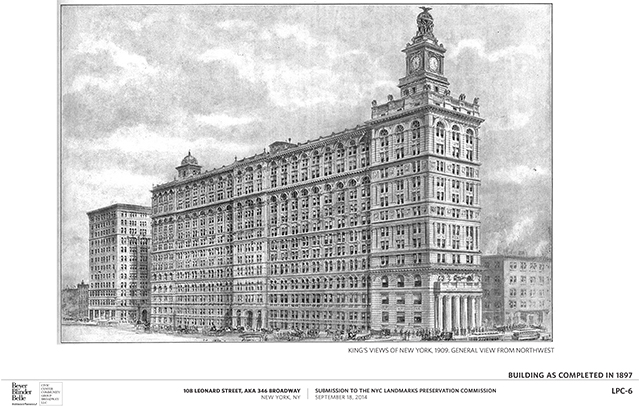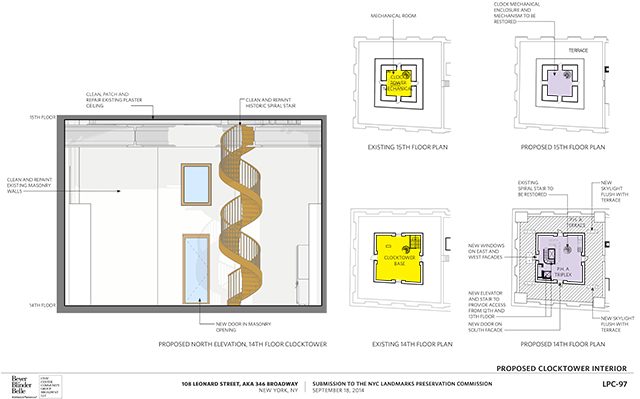A TriBeCa landmark will see new life, thanks to the action of the Landmarks Preservation Commission. On Tuesday, the commissioners voted to approve the conversion of the former New York Life Insurance Company Building at 346 Broadway (a.k.a. 108 Leonard Street) from city-owned office building to private residences.
The project was developed by the Peebles Corporation and the Elad Group and designed by architect John Beyer of the preservation architecture firm Beyer Blinder Belle. The 1898 building, originally commissioned to Stephen Hatch and completed by McKim, Mead & White, will become 144 condominiums.
The process here was particularly contentious since the building is both an individual and interior landmark. If a building is just an individual landmark, the commission does not have jurisdiction over anything not seen on the exterior.
Among the largest issues of contention at the November 18 hearing was the clock tower, which is one of the designated interiors. Some of the commissioners, along with several people who delivered public testimony, wanted it open to at least the population of the building. Many also wanted the mechanism to remain in its current manually wound state. Beyer said that the area has been determined to be “inaccessible” to the public, both practically and legally. The tower will be accessible to the owner of the unit to which it is attached. The commissioners cannot mandate the continued functioning of the clock, but Beyer said they are pledging to keep the hands of time turning, only instead of being wound every two weeks, they will be electrified. Further, he said that the manual mechanism will remain, meaning that it could be restored to manual operation in the future. Also worth noting is that the bell will still ring and that the clock will be weatherproofed by a glass liner.
A globe sculpture used to top the clock tower, but has been lost to time. Beyer said that while they don’t have a current proposal, they are “committed” to installing a new globe. That will need further city approval given its height.
Beyer pointed out that several additions were made to the roof after the original completion of the building. The size of the newly proposed modifications were a concern to the commissioners. So, they have reduced elevator access to the roof from two elevators to one elevator. Also, the setback from the east pavilion has been increased from six feet, eight inches to nine feet, eight inches.
The balustrades will not be uniform, but will reflect their current and non-uniform design. However, there will be larger openings. Beyer said that when the building was completed, the roof was simply for mechanical purposes. So, views were not a major consideration. Now they are.
A proposal to have a gate on the Broadway entrance did not go over well last time. The gate was removed from the proposal. Also not wildly popular last time were the balconies proposed for the Leonard Street side. They, too, have been removed from the proposal. Significant patching work will be required.
The elevators are being removed from the Leonard Street lobby. So, grills will be constructed to recall them.
Finally, Beyer discussed the proposal to move another landmark, the president’s office suite, from the fourth floor to a more accessible location on the second floor. The floor will be changed so that the entire office suite can be moved as is to the second floor.
In the end, the commissioners were very supportive of the proposal. Several wished the clock could still be run manually, but accepted that having it function at all, which they can’t mandate, is something they should be okay with. Commissioner Michael Goldblum said the debate was whether they are charged with regulating “things” or “processes.” The clock’s existence, a “thing,” is what they are regulating. He called the project as a whole a “major win.” Commissioner Adi Shamir-Baron called the project as a whole “beautiful” and “extraordinary,” but when it came time to vote, she could not vote to allow the changes to the clock. The rest of the commissioners present did vote to approve the proposal without reservation and the proposal was approved.
Evan Bindelglass is a local freelance journalist, photographer, cinephile, and foodie. You can e-mail him, follow him on Twitter @evabin, or check out his personal blog.
Subscribe to YIMBY’s daily e-mail
Follow YIMBYgram for real-time photo updates
Like YIMBY on Facebook
Follow YIMBY’s Twitter for the latest in YIMBYnews







